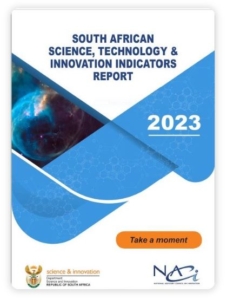29 September 2023
The 2023 South African Science, Technology and Innovation Indicators Report (July 2023), produced by the National Advisory of Innovation (NACI) as part of its mandate from the 2019 White Paper on Science, Technology, and Innovation, aimed to monitor and evaluate South Africa’s national system of innovation (NSI). The report provides data and information about the NSI without offering interpretations or recommendations. It highlights various aspects of South Africa’s Science, Technology and Innovation (STI) landscape.
Research and development expenditure: Gross expenditure on research and development (R&D) as a percentage of GDP declined from 2017/18 to 2020/21, with disparities in provincial R&D expenditure. Business-sector expenditure on R&D has decreased for the past decade and is primarily internally focused. Limited funding for external R&D, is concentrated on higher education and science councils. The business sector capacity to attract foreign funding is declining.
STI human resources and expansion of research capacity: Efforts to increase academic staff with doctoral degrees are unlikely to meet the 75% target set for 2030. The growing proportion of staff over 60 years of age, may result in a loss of qualified staff due to retirement. The Department of Higher Education and Training is making an effort to develop future generations of academics ad to close the gender gap among academic staff.
STI Outputs: Despite various initiatives over the years to increase the output of science, engineering, and technology (SET) graduates, the percentage of graduates in science, engineering, and technology has not increased significantly. However, since 2015, the relative percentage of female doctoral graduates in the STEM fields surpassed those of male graduates and there has also been an increase in black doctoral graduates. South Africa has witnessed a rise in scientific publications, but its world share remains around 1%. Domestic patents have increased, from 2005 to 2021, but it remains lower than a decade ago.
STI for Socio-Economic Impact: After an initial period of growth from 2011/12 to 2017/18, the number of researchers in south Africa has decreased since 2018/19. These researchers are mainly concentrated in the higher education sector. Science councils have also seen a decline in researchers.
South Africa faces socio-economic challenges, including poverty, income inequality, and unemployment, making it crucial to integrate innovative solutions into the policy agenda to address these issues.
Overall, the report provides a comprehensive overview of South Africa’s STI landscape, highlighting areas of concern and potential areas for improvement. It emphasizes the need for complementary studies to further interpret the evidence presented.
Download the report here
Access the NACi release here


